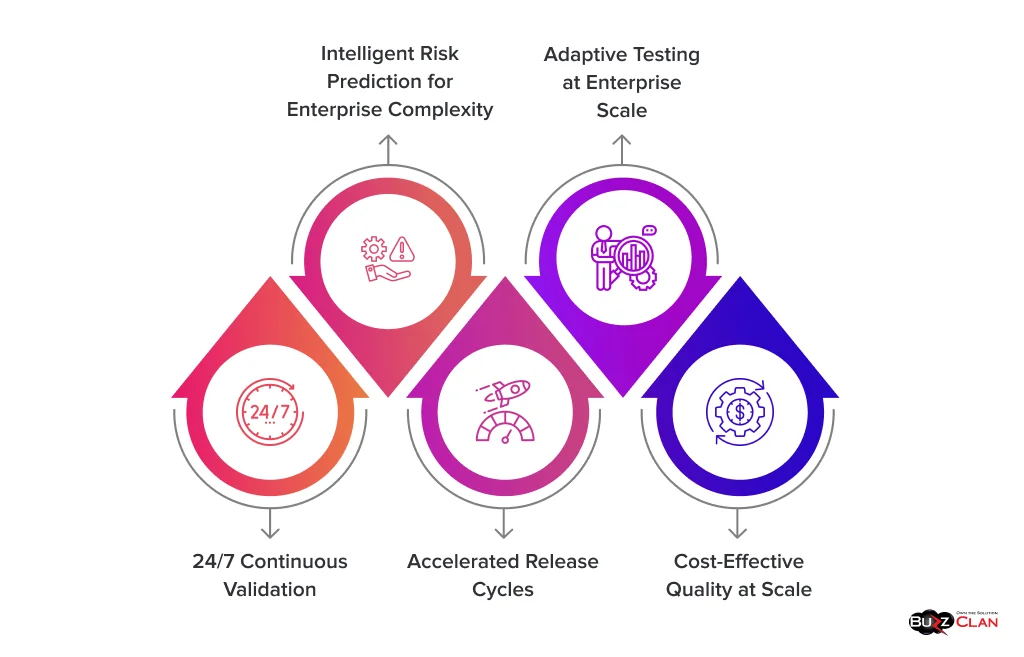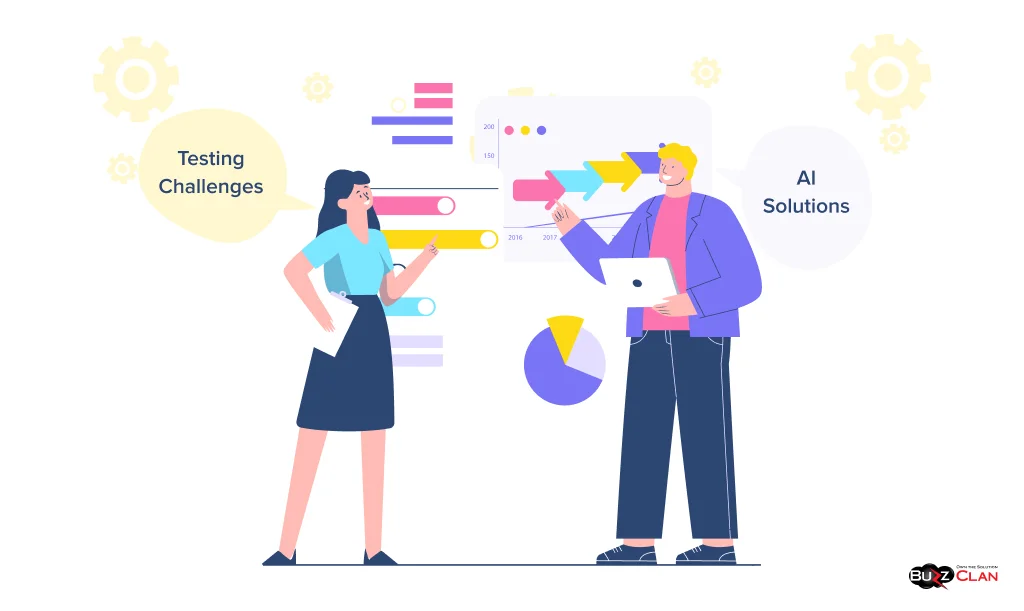The Competitive Advantage of AI in Software Testing For B2B Companies
Om Prakash Gautam
Sep 5, 2025
Software testing has always been essential, yet it’s often the stage no one is really excited about. Long regression cycles, repetitive manual checks, and the constant risk of missed defects make it a challenging process even for experienced QA teams.
And as enterprise applications become more complex, these challenges only grow along with the cost of failure.
A Forbes study found that a bug costing just $100 to fix during planning can escalate to $10,000 if discovered in production. For B2B companies, those delays or failures don’t just mean higher costs—they can impact client trust, service-level agreements, and competitive positioning.
This is where AI is starting to make a real difference. The use of AI in software testing is already helping organizations accelerate test cycles, reduce human error, and catch risks earlier in the release process.
A recent study predicts that by 2027, 80% of enterprises will adopt AI in software testing—a clear sign that this shift is underway.
In this blog post, we’ll break down what AI in testing really means, why it’s becoming critical for B2B companies, and how it can transform QA from a bottleneck into a driver of business growth.
What is AI in Software Testing?
AI in software testing refers to the use of machine learning, pattern recognition, and intelligent automation to enhance how software is tested. Instead of relying solely on manual testers or rigid scripts, AI systems can analyze historical defect data, identify patterns, and predict where new issues are likely to occur. They can also execute tests automatically, at a scale and speed that human teams cannot match.
Why AI-Powered Testing Creates a Competitive Advantage in B2B Markets?

Traditional testing approaches weren’t designed for today’s B2B software reality. Enterprise applications now integrate with dozens of third-party systems, serve multiple user roles with complex permissions, and must maintain uptime standards that consumer apps rarely face. Manual testing teams simply cannot validate every integration scenario, user workflow, and edge case that enterprise clients depend on.
AI-powered testing solves these uniquely B2B challenges in ways that create measurable competitive advantages:
- Intelligent Risk Prediction for Enterprise Complexity – AI analyzes historical defect patterns and system dependencies to predict where failures are most likely in complex enterprise environments. This means catching integration issues before they impact client workflows, not after.
- Adaptive Testing at Enterprise Scale – As B2B applications add new features, integrations, or compliance requirements, AI automatically generates and updates test cases to ensure seamless integration. Your testing coverage grows with your product complexity without exponentially increasing QA overhead.
- 24/7 Continuous Validation – Enterprise clients expect consistent performance across time zones and usage patterns. AI runs comprehensive test suites continuously, ensuring your software meets enterprise reliability standards around the clock.
- Accelerated Release Cycles – While competitors spend weeks manually validating enterprise features, AI-enabled teams can confidently release updates in days without compromising on quality. This speed advantage compounds over time, allowing you to respond faster to client feature requests and market opportunities.
- Cost-Effective Quality at Scale – Instead of expanding QA headcount for every new enterprise client, feature, or integration, AI amplifies your existing team’s capabilities. Automated test generation and intelligent prioritization reduce repetitive manual work while ensuring broader coverage.
The result: you achieve enterprise-grade reliability without enterprise-sized QA costs. These efficiency gains strengthen unit economics, enabling you to scale your B2B customer base while maintaining intact margins.
Want these advantages for your business?
Common B2B Testing Challenges & How AI Solves Them

Every B2B software team faces the same testing reality: enterprise clients demand flawless performance while internal teams struggle with resource constraints and complexity. Through our work with Fortune 500 companies and growing B2B startups, we’ve identified the testing challenges that consistently impact business outcomes and how AI transforms these pain points into competitive advantages.
Challenge: Enterprise Integration Complexity Overwhelms Manual Testing
B2B applications rarely work in isolation. They integrate with CRM systems, payment processors, identity providers, and custom enterprise tools. Each integration creates exponential testing scenarios that manual teams simply cannot cover comprehensively.
Consider a typical enterprise SaaS platform: it might integrate with Salesforce, Microsoft Active Directory, Stripe, and three custom APIs. Testing every possible combination of data flows, authentication states, and error conditions manually would take weeks—if it’s even possible.
How AI Solves It: AI-powered testing automatically generates test cases for integration scenarios by analyzing API contracts, data flows, and system dependencies. It identifies critical paths that human testers might miss and continuously validates integrations as systems evolve.
Challenge: Release Deadlines Under Pressure
Enterprise clients expect regular feature updates, but B2B software releases carry higher stakes than consumer apps. A broken enterprise workflow doesn’t just inconvenience users—it can disrupt business operations for hundreds or thousands of employees.
The pressure to meet quarterly release commitments often forces teams to choose between speed and thorough testing. Manual regression testing becomes the bottleneck, leading to either delayed releases or risky deployments with incomplete validation.
How AI Solves It: AI accelerates regression cycles without sacrificing coverage. Machine learning algorithms prioritize test execution based on code changes, historical defect patterns, and business impact. This means running the most critical tests first and expanding coverage as time permits.
Challenge: Multi-Tenant Architecture Creates Testing Blind Spots
B2B SaaS platforms serve multiple enterprise clients through shared infrastructure, but each client often has unique configurations, customizations, and usage patterns. Traditional testing approaches struggle to validate how features behave across different tenant configurations without exhaustive manual setup.
How AI Solves It: AI testing platforms automatically generate tenant-specific test scenarios based on configuration data and usage analytics. They simulate different enterprise environments, user loads, and customization combinations to ensure features work consistently across all client implementations. This eliminates the “it works in our test environment” problem that plagues multi-tenant applications.
Challenge: Compliance and Security Testing Requires Specialized Expertise
B2B companies in regulated industries face stringent compliance requirements—HIPAA for healthcare, SOX for financial services, GDPR for data processing. Security vulnerabilities that might be minor annoyances in consumer apps can trigger regulatory fines and contract breaches in enterprise environments.
Manual security testing requires specialized skills that many teams lack, and it’s nearly impossible to test every security scenario comprehensively within typical release cycles.
How AI Solves It: AI-driven security testing continuously scans applications for vulnerabilities using constantly updated threat intelligence. It automatically tests authentication flows, data encryption, access controls, and compliance requirements without requiring deep security expertise from QA teams.
Challenge: Scale and Performance Under Enterprise Load
Enterprise applications face usage patterns that are impossible to replicate manually: thousands of concurrent users, complex workflows running simultaneously, and peak loads that vary dramatically by client and season. Performance issues that only appear under enterprise-scale load often go undetected until production.
How AI Solves It: AI-powered performance testing uses machine learning to generate realistic load patterns based on production analytics. It automatically scales test scenarios, identifies performance bottlenecks, and predicts system behavior under varying loads. More importantly, it learns from each test run to continuously improve load modeling accuracy.
B2B companies using AI testing report not just faster releases and fewer bugs, but improved client retention, reduced support costs, and the ability to pursue larger enterprise deals with confidence.
How Leading B2B Companies Get QA Right with AI?
Most B2B companies struggle with AI testing implementation because they focus on tools instead of strategy. At BuzzClan, we’ve learned that successful AI testing requires more than just technology—it requires a business-first approach that aligns with your specific enterprise challenges.
Our Track Record Speaks:
- European Tier 1 Bank: This major financial institution came to us after their previous AI testing implementation actually slowed down releases. The problem wasn’t the technology—it was the strategy. We implemented intelligent test prioritization based on their specific risk patterns and compliance requirements, resulting in 80% faster regression testing while maintaining zero critical production defects.
- Detroit Water and Sewerage Department: Critical infrastructure can’t fail. We designed AI testing that learned from their operational patterns, automatically generated tests for infrastructure scenarios their team hadn’t considered, and provided 24/7 monitoring. Result: 90% test coverage across all critical systems and proactive issue detection that prevented 12 potential service disruptions.
- Boston-based Asset Management Firm: In financial services, speed and accuracy are both non-negotiable. Our AI testing approach improved their execution speed by 70% while meeting stringent regulatory requirements, enabling faster product iterations in competitive markets.
What sets BuzzClan apart is not just technology, but process. Every engagement is built on a framework of continuous improvement and compliance-first thinking. Our team aligns QA with business objectives, integrates seamlessly into DevOps, and provides ongoing support long after deployment.
Conclusion
Artificial intelligence in testing is more than an emerging trend—it represents a fundamental shift in how enterprises assure quality. By moving beyond repetitive scripts and manual oversight, AI brings intelligence to every stage of QA: from designing smarter test cases and maintaining them automatically, to predicting risks and optimizing test execution.
The outcome isn’t just efficiency. It’s shorter release cycles, stronger reliability, and the confidence to scale enterprise applications without compromising quality. Organizations that embrace AI in testing are already seeing measurable gains in accuracy, productivity, and client satisfaction advantages that compound with every release.
See how BuzzClan transforms QA into a competitive advantage for enterprises, with its software testing services.
FAQs

Get In Touch
